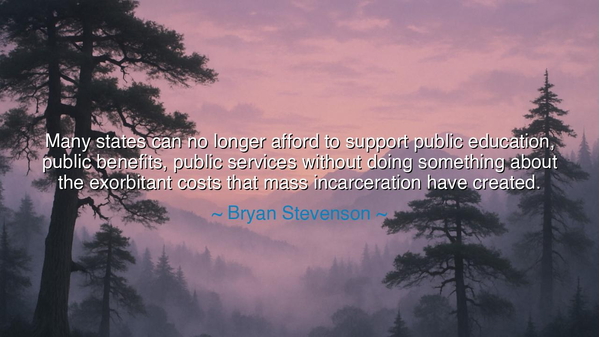
Many states can no longer afford to support public education
Many states can no longer afford to support public education, public benefits, public services without doing something about the exorbitant costs that mass incarceration have created.






"Many states can no longer afford to support public education, public benefits, public services without doing something about the exorbitant costs that mass incarceration have created." Thus declared Bryan Stevenson, the tireless advocate for justice, founder of the Equal Justice Initiative, and defender of the condemned. His words are heavy with lament, yet burning with truth: a society that binds itself with chains and prisons cannot build schools, cannot uplift the poor, cannot care for the weak. For the wealth of a nation is devoured when mass incarceration becomes its answer to fear, inequality, and despair.
The meaning of his cry is clear. Every dollar spent on filling prisons is a dollar not spent on public education, a dollar not spent on public benefits, a dollar not spent on public services that could uplift communities and prevent crime in the first place. When the state chooses bars and guards over books and teachers, when it chooses cells over care, it condemns not only those imprisoned but the entire society to a cycle of poverty, ignorance, and division. Stevenson shows us that the prison crisis is not merely about justice—it is about survival, about what kind of future a nation chooses to build.
History gives us mirrors of this truth. In the waning years of the Soviet Union, the state poured resources into armies, weapons, and surveillance, neglecting food, schools, and infrastructure. The cost of repression drained the lifeblood of the people until collapse became inevitable. Though not the same in form, the lesson is alike: when a nation spends its treasures on control rather than growth, it destroys itself from within. Stevenson’s warning is prophetic: mass incarceration is America’s chain around its own neck.
But there are also stories of hope. Consider the work of nations like Norway, which turned away from punishment as the core of justice and invested in rehabilitation, education, and humane treatment even for offenders. The result was a lower rate of reoffending, healthier communities, and a system that cost far less in the long run. By choosing compassion and wisdom over vengeance, they built a justice system that freed resources for schools, services, and growth. Stevenson points us toward such paths, where justice is not chained to cruelty, but joined with renewal.
His words also echo with moral urgency. To spend endlessly on incarceration while denying children the fullness of education is not only foolish—it is unjust. It betrays the generations yet to come, who inherit a society weaker, poorer, and more divided. For every school unfunded, for every service cut, the cost of prisons multiplies. Thus, Stevenson declares that reform is not optional; it is the only way forward if a nation wishes to live rather than to crumble.
The lesson is plain: we must measure the true cost of our priorities. To choose prisons over schools, punishment over opportunity, is to plant seeds of despair. But to redirect resources toward education, toward benefits, toward services that heal and uplift, is to build a future of hope. True justice is not the endless caging of men but the prevention of suffering, the breaking of cycles, the lifting of communities from poverty into dignity.
Practical action follows. As citizens, demand reform. Learn the truths of mass incarceration, speak against its injustices, and support leaders who choose schools over prisons. As communities, invest in youth, in mentorship, in programs that build rather than break. And in your own life, cultivate compassion: do not see the imprisoned as lost forever, but as human beings who, if restored, may one day return as contributors. For the fate of the imprisoned and the fate of the free are bound together in one destiny.
So I say to you, children of tomorrow: remember the words of Bryan Stevenson. A nation cannot thrive when it builds prisons instead of schools, when it pours treasure into chains rather than opportunities. Reform is the path of survival, compassion the path of strength. Choose to invest in people, not prisons, in education, not incarceration. For only then shall the soul of a nation be redeemed, and only then shall its children inherit a land of hope rather than a graveyard of squandered dreams.






AAdministratorAdministrator
Welcome, honored guests. Please leave a comment, we will respond soon